#radish life
Text

These roasted radishes were so good... I tossed them in some oil & some lipton onion soup mix and roasted them in the oven.. . Yum!
The cabbage was an afterthought, roasted and put some Italian spice mix on top.

Someday someone is gonna look at me like this....
I need to focus on myself.
#healthy lifestyle#getting healthy#losing weight#healthy eating#fitblr#healthy habits#operation lose this gut#weight loss#operationlosethisgut#weight loss journey#roasted radishes#radishes#radish life#veggie life#eat your veggies#veggies#calorie deficit#home cooked#home cooked meal#home cooking#quick dinner#dinner#my dinner#weight control#weight#eating for weight loss#road to 169#low calorie#fat loss#losing fat
13 notes
·
View notes
Text
I grafted trees for the first time today - apples! Now I just have to wait several weeks to see if they take... I know I did a pretty rough job between it being my first attempt and not having a proper grafting knife.
7 notes
·
View notes
Text
You just got scarrrr’d (reblog to inflict this fate on more unsuspecting people)

#art#fanart#secret life spoilers#secret life#secret life smp#secret life fanart#gtwscar#gtws#gtws fanart#goodtimeswithscar#you are not immune to the goodtimes#sl!scar#he’s just a cowboy to me#Radishearts#radish art
3K notes
·
View notes
Text
Scarameow vs final exams season
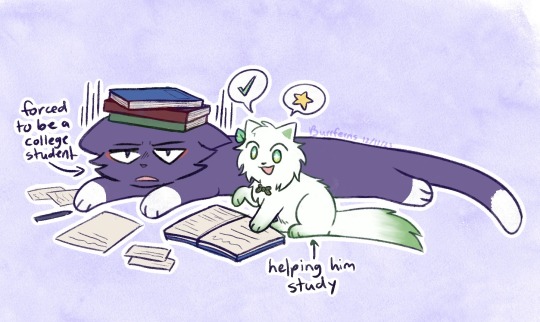
#scaramouche#nahida#wanderer#hat radish#Genshin#art tag#animalifiedart#drawn in 30 minutes becwuse I am Also fighting for my life with College finals#fanart#animal art#queue
393 notes
·
View notes
Text
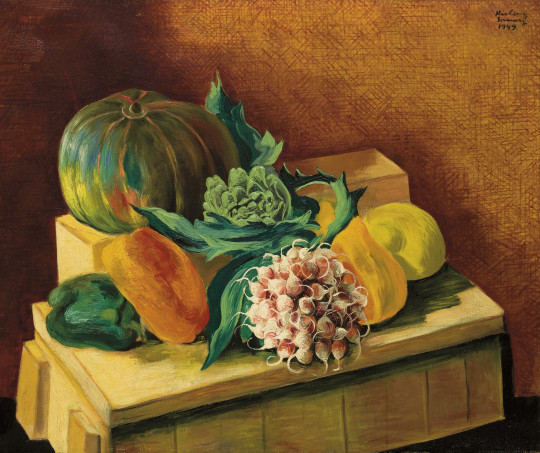
Moïse Kisling (Polish/French, 1891-1953), Aux radis, 1949. Oil on canvas, 55 x 46 cm.
#moïse kisling#moise kisling#polish art#french art#still life#vegetables#radish#radishes#pumpkin#artichoke
222 notes
·
View notes
Text

lucy is making a mixtape
#what more is there to life than to make silly little art for my silly little tv show? i am happy with this#lockwood and co#radish art#george karim#lucy carlyle#anthony lockwood
584 notes
·
View notes
Text

Radishes on the VE day , Victory Europe Day - Brita Granstrom
Swedish,b.1969-
Acrylic on canvas , 12 x 12 in.
44 notes
·
View notes
Text
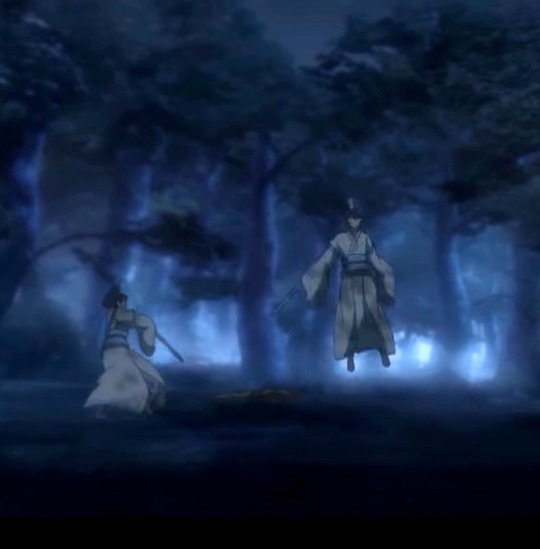
what they doin
#this is the funniest screenshot I’ve ever taken in my life bYEEE#mdzs#the untamed#lan sizhui#lan jingyi#mdzs donghua#mdzs meme#mdzs crack#mdzs shitposting#look at my boy levitating#the radish is ascending#mo dao zu shi#grandmaster of demonic cultivation#boys night out
90 notes
·
View notes
Text

"Herbs and radishes", 20x25 cm, gouache, oils
#my art#gonna tag thos as#academic endeavors#cause it's technically a study for my class#but also a just felt like painting some stuff mun brought from the market#still life#herbs#painting#traditional art#oil painting#goache#art#artists on tumblr#radishes#radish art#garlic
60 notes
·
View notes
Text
#double life#traffic light smp#trafficblr#mumbo jumbo#geminitay#ldshadowlady#not to sway the vote but I'm saying number 2 btw#like. idk if this makes sense. but to me mumbo & gem would be like. a tibetan spaniel and a tibetan mastiff#where mumbo is just quivering and shaking and trying to build his funny machines to keep his base safe#and gem is out bare-fist brawling and beating etho to death#and skizzielizzie would have been sooooooooo fun#skizz who has the building skills of a radish but is actually pretty decent at survival#versus lizzie who is building hashtag aesthetic af castles and cottages and is trading 3 ancient debris for 16 orange dye
26 notes
·
View notes
Text
one of my favorite tropes is when an ridiculously strong/overpowered muse takes up a rather mundane hobby or job and just enjoys life without a care in the world
#ooc#tropes#goku with radish farming#ruby becoming a ceo#blair with her kingdom and so many more examples#it's so endearing to see them live their life how they want#and not have it be dictated by their abilities and power#them saying fuck you to the norm of becoming a hero and just being content with their own desires
23 notes
·
View notes
Text
Ezra's helping clean out a condo for a family member who's selling it, and we get to take just about whatever we want from the place, which meant that my lifelong dream of having a down comforter just came true! Unfortunately, I have now discovered how expensive duvet covers are.
This is not dissimilar to when I got a really nice lamp at a tag sale a few years back but then it sat unused on my floor until a couple months ago because I realized even the cheapest decent-looking lampshades cost three times what the lamp did...
#the curse of feeling great about getting something for free or cheap#and then realizing you've obligated yourself to spend a bunch of money actually#radish life
10 notes
·
View notes
Text
It’s almost like they’re birds of a — no I shan’t say 👀
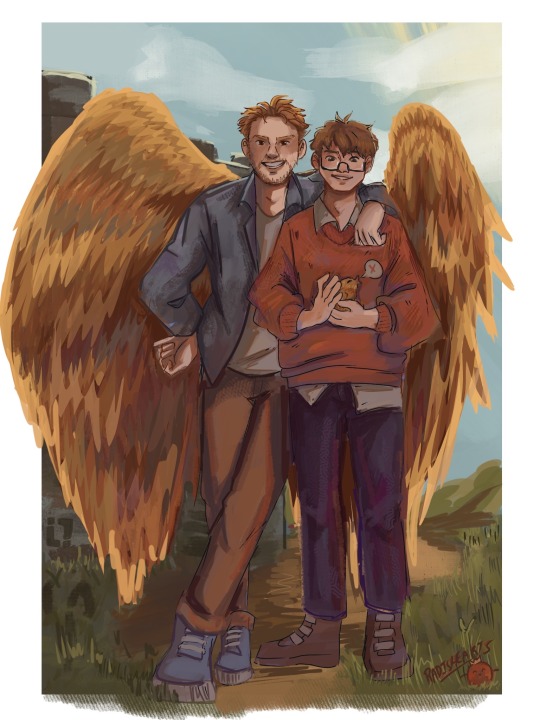
Reblogs appricoted :>
#art#fanart#secret life#secret life spoilers#jimmy solidarity#grian#grian fanart#solidarity fanart#sl!grian#sl!jimmy#< ok but I’m obsessed with this episode#it might be something I think about forever#literally I was taking to a friend about how funny it would be if they readded them to help with people complete tasks#and here we are#anyways I like to think Jimmy thinks he’s just being seen as himself#but in reality Grian was was talking to just some little canary bird#like if barrholemew from TBP was actually seb#< is rambling btw#radish art#Radishearts
2K notes
·
View notes
Text
How evil is arlecchino and what is she cooking
As of 4.2, I’m really curious what they’re planning with Arlecchino as a character, especially as a villain/antagonist/morally dubious character, and how far/which direction they may go with that
Intuitively my impression is we’ll see her do something way more “villainous” than she presents herself as being for majority of Fontaine’s AQ in front of us right—(which isn’t a surprise given that, you know, Arlecchino nor the House of Hearth have never been presented as 110% ethical LOL) but I find myself not being in complete agreement with most analysis or speculation threads I see about Arlecchino’s morality and the like, level of sinister people seem to ascribe to her.
Idk how to put it, especially in regards to her children I do agree they are not a wholesome found family, that Arlecchino is not above pulling strings or using them for her own ulterior motives, but I kind of hesitate on the idea she only cares about the Hearth children as a means to the end/things she can control and there’s nothing else going on with her characterization wise there. I’m not saying that impression seems remotely unreasonable or unfounded, but just that it feels there’s something intentionally missing in how we are supposed to conceptualize her as a person
My main reasoning for this hunch is the fact they have not elaborated on Arlecchino and the previous Knave—who Arlecchino is stated to have taken over the position from by force. The extra tidbits I think about are that 1) Arlecchino was previously an orphan in the Hearth 2) the previous Knave is described as way, way crueler to the children of than Heart than Arlecchino was from when she took control of the House
Often, people’s major indicators that the House of the Hearth is kind of super fucked up are the NPCs we meet in world quests who are part of it and clearly suffering. But one thing I haven’t ever seen people mention w this that i think is a very interesting detail is, in The Very Special Fortune Slip Inazuma worldquest, where we stop this House of Hearth guy (Efim Snezhevich) from manufacturing tension between Watasumi/the Shogunate to restart the war with his other Hearth subordinates, at the end of the quest we get this dialogue that reveals he had been acting under the previous Knave’s directives:
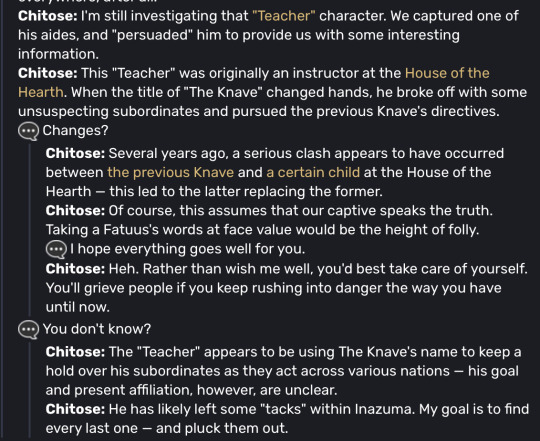
It’s also mentioned he’s employing this plan in an attempt to “rebuild the prestige of the Knave” following Signora’s death, iirc? Now, see, the dialogue itself says that this is “assuming our captive is telling the truth” so who knows what’s really going on, but I find this a really odd/interesting thing to highlight. I’m a bit fuzzy on other world quests with Hearth members, and am not saying none of them were acting and subsequently being treated poorly by our Arlecchino, but like, this gives me a lot of questions especially when paired with implications this previous Knave seemed to be way worse
Like, what drove Arlecchino to take over? How unexpected and controversial was this within the House? Assuming the above information is all true it definitely says something this guy went rogue and acted on what the previous Knave would want and didn’t think our Arlecchino would greenlight it, which does feel consistent with the previous Knave being described as basically worse & crueler than our Arlecchino. It also makes me question how much house of hearth things we’ve seen outside the main story are the work of our Arlecchino or if there’s a bigger divide of loyalty. Heck, I could be wrong but it doesn’t even seem like we know if the previous Knave is dead or not
This isn’t me saying Arlecchino couldn’t possibly be treating hearth children worse than she wants us to know, especially ones who aren’t her “favorites” the way the fontaine trio seem to be, but I really don’t feel sure about making a solid conclusion of her exact level of malice the way ppl r generally understanding it rn when it feels there’s going to be more about her. Just the idea of she, as a Hearth child, clashed with the previous leader who was known for being cruel, overtook their position and took on less harsh methods of leading that made at least some members with more power/possible closer proximity to the previous Knave go rogue and try to commit atrocities in the previous Knave’s name…I feel this leaves a lot of room to suggest there’s more going on with how Arlecchino is as a person
I don’t mind if she’s just very evil and deceptive bc if she totally had me fall for thinking she was less evil than she actually was that’s fun tbh. But I feel people suggest that’s all her character could be with no degree of like, “sympatheticness” or deep grey morality and that if her character did go there it would be automatically poor writing and genshin walking back on making a truly evil woman when IDK. I feel you can claim at this point they have left it open ended and it’s never been completely confirmed she’s pure evil. Also sometimes I just get a hunch and feel cautiously confident in Genshin executing certain characters well. Not all characters, just certain ones. Especially given Fontaine’s character writing being very good and a character like Lyney feeling very solid to me when any development with Arlecchino would likely involve him and his siblings as well, I honestly feel open to the idea of Arlecchino being satisfyingly written to be both villainous/morally dubious but “sympathetic/likable as a person” in ways outside of just her ruthlessness if that makes sense
If I’m wrong/they drop the ball with it more than I anticipate I’ll eat my hat but I am pretty excited about her character and which way they decide to go with it. I will say the only potential impression I have of where they’ll go with her has been wondering if it will go in a “cycles of abuse” direction—I’d be surprised if they ever elaborated on Arlecchino’s character especially in how she feels about things and her also growing up as an exploited child of the hearth wasn’t relevant
#arlecchino#see my track record with said hunch with when I feel I should let genshin cook has been#for months truthing my vision of xiao’s speififc brand of internalized dehumanization induced suicidal ideation#and how genshin will one day he will get another quest of sorts thst develops his character towards#the idea he’s allowed to live and enjoy people’s company and this will likely#also come with following through on yaksha lore and when they do this they will do him SO well and it will be peak genshin quest#all of this Months before the existence of perilous trails was even rumored#and then I was soo stubborn xiao would show up in 2023 lantern rite w more character introspection to follow up PT#and also from the first fontsine teaser I was in the trenches for furina bc I felt so confident#the main storyline would handle her very well & if genshin went anywhere near the direction of her#not being a ‘true archon’ & ppl were Wrong if they thought genshin woudlnt take her seriously#and HAHA. WWOOWOOWOWOEOEOOEOEE#I have also been sent into hysteria multiple times bc genshin keeps canonizing my exact ideas of my favorite character dynamics#and often exceeding my expectations that I thought were jsut wishful thinking#yes I predicted exactly how xiao would interact w Venti & zhongli on screen yes I predicted#the exact nature of hat radish friendship no I was wiped out on the floor#by nahida enrolling wanderer in college & calling him hat guy & zhongli saving xiao’s life#& xiao having hardcore social anxiety from zhongven flirting with each other st the dinner table#this sounds so conceited. see I often don’t know What genshin is cooking but k feel sure in knowing when soemthing is going to be#a shitshow or mediocre or when we need to let them cook. even if it takes 6+ months#TRUST ME <— guy who has been waiting on genshin to cook for several characters for multiple years and is still sure I will get my food#am I crazy. yes. am I also often right when I have hunches on when genshin is going to suck and when it’s going to be good esp character#writing wise. often yes#one day I will annihilate genshined impact with my bare hands#genshin#fern.txt#fandomferns
70 notes
·
View notes
Text
nahida, irminsul, and representations of cognition throughout: an analysis
As the god of wisdom, it is probably intuitive that Lesser Lord Kusanali is depicted as someone omniscient, uber wise, indomitable in logic and without flaw of reasoning. More often than not, though, throughout the archon quest and story quests, we have been shown some of her shortcomings, from her lack of knowledge in certain aspects, and her susceptibility to certain forms of trickery. In this brief analysis we discuss aspects of human cognition and learning, and compare them to aspects from the story, providing evidence for the contrary—that, perhaps, there is no better representation of wisdom in the challenging nature of Teyvat than a god like her.

(Note: I do not claim to be any sort of expert in the topics I discuss here; this is merely a subjective analysis based on what I've learned of cognitive psychology and observed in canon. And, as with everything else I do, I did this simply because I was bored and I like overthinking things. Read at your own discretion.)
To me, Nahida, Irminsul, and Sumeru's stories are almost like this… super well crafted personification of working human intelligence itself. On a larger, fantastical scale, of course.
We know that the Irminsul is Teyvat’s repository of information—basically the brain. We know that Nahida is a branch of Irminsul, a part of that brain. And, well, this “brain” is actually represented in ways that are almost quite realistic, in many senses.
For starters: one of the most important functions of the brain is that it acquires information—that it learns. It accumulates knowledge, and while neurons do break down (and are not easily replaced, if ever), information is actually quite robust and does not “disappear” easily, besides the natural decay of time. There have been cases where people have lost part of their brains to accidents, yet retain their memories and even cognitive functions intact—the brain is actually far more malleable than one may think.
And in fact, you don’t “unlearn” things. You can’t “remove” things from your mind as easily as you imagine it—most of the time, when you “unlearn” or “extinguish” something, you really are just learning a new association that counters the old one. This new association takes time to develop, and spontaneous recovery often occurs—it takes time to “unlearn” something, or to “relearn” concepts. In life, we often have to correct our false preconceptions (not just in science!) and adapt to an ever-changing world—this constant process of unlearning and relearning and correcting is, essentially, what makes us “wiser”—the more we know, the more we understand. It is a constant growth of the mind.
Nahida, then, being the deity of wisdom who rules over all knowledge, is a form of being where regular learning processes in cognition are essentially amplified: there is no normal degradation of “memory” (as things are stored in Irminsul reliably); there is no loss of information, and yet Nahida is still able to learn new concepts and understand how they relate to the old ones, revise her understanding based on most recent evidence or events. Basically, she learns quicker than mortals with minimal risk of decay; she is a god, this element of hers (arguably) understandably exists.
But we also know: Irminsul itself is not perfect. We know that memories of Irminsul have, indeed, been deleted or altered. Of course this could easily be chalked up to the fantasy aspect outside of the analogy, but this could still be explained in terms of regular brain anomalies. Deleted memories could be analogous to memory loss in a sense (anterograde amnesia, cf. retrograde amnesia), while altered memories are, in fact, pretty common in real life—perhaps even more so than memory loss, for various reasons pertaining to heuristics, bias, and preconceptions—even though we tend to not realize it at all, unlike the glaring effects of memory loss.
Putting aside the why’s and how’s for now, memory loss is typically more noticeable than altered memory, but either way, the brain can actually accommodate for memory losses/alterations by bending to fit the “narrative” they previously had. The brain doesn’t like inconsistencies and gaps—it will try to explain something in the most coherent way possible with whatever available facts, which is actually a helpful adaptation to have in case we cannot obtain every piece of data we need. (The phenomenon is most common in terms of visual gaps, but is also prevalent with other senses and also with memory. For more, look up constancy bias.) Though, of course, in the case of memory loss or alteration, this isn’t necessarily a good thing. But in fact, this is what Irminsul does—it restructures itself accordingly with what facts are available, constructing a “coherent” narrative that, as we know, is false.
From this, we’ll be branching out to two points. The first is that Nahida’s existence aligns with this analogy in the sense that the removal of knowledge from Irminsul (of which she is an avatar of) is representative of the “weakening” or “shrinking” of the brain. As mentioned previously, this is not in the physical sense, for the case of the brain—but because Nahida is the physical representation of the abstract brain, then it makes sense that she shrunk during the eradication of forbidden knowledge. She lost all that knowledge gained—it would have mean her “growth” and “learning” has essentially reverted, hence she returns to a “younger” form of who she once was (see Nahida’s 2nd SQ) (though in act 5 of the AQ, it was Rukkhadevata splicing a branch off Irminsul itself, the image still stands that what’s left of the knowledge once forbidden knowledge has been taken away is not much).
Now what, exactly, forbidden knowledge is, we don’t know yet, but how it affects the brain would not be so much of a mystery—there are pieces of insightful or revolutionary findings that can influence plenty of one’s beliefs, or the way one sees and interprets the world, which would then change the way one process information and generates new thoughts in turn. For example, imagine that one day you wake up with the existence of “blue” gone from your mind. Nothing is blue to you—things that you would once call blue will look greenish-yellow to you, even the feeling of “blue” will simply be called “depressed”, or something else, but nothing in the world will be blue to you. That simple “removal” can change a lot of things from how you perceive to how you describe, which is why the effects of removing forbidden knowledge can take a huge toll, or at least a huge change, on Irminsul—hence the big metaphorical brain, hence Rukkhadevata, hence Nahida.
And second, what happened to “Irminsul” being perfect? We cannot call Irminsul a repository of “perfect” knowledge, i.e., that every information it contains is true to the core, because we know the information stored in Irminsul is faulty and malleable. In fact, Irminsul being “perfect” is with respect to its functionality as a brain, as a system. Theoretically, when exposed to true information, a perfect brain should contain only true information. But we know there are forces beyond Teyvat, ones that Irminsul inherently can’t capture/perceive (e.g. the twins). It’s like us not being able to understand a dolphin’s cries, or the color vision of a shrimp, or anything beyond three-dimensional vision—this is inherently the nature of Irminsul itself to not capture that information (with exceptions I'll come to later). Irminsul is still an essentially “perfect” functioning brain, but inherently not designed to capture that beyond its scope. Which then would make sense why it can be altered or robbed of memories in such a way that it would not “break”—it can self-regenerate, it can still function brilliantly. It thinks it functioning perfectly fine means it’s still intact, when in fact, it has been contaminated with false information without it even realizing.
Back again: this is very much like the brain, like human cognition. Because rational humans make judgment based on the available facts, this becomes a problem when your facts are wrong. Usually, with humans, there is a degree of confidence to which you would know whether what you know is right—but if you have a “perfect” brain like Nahida theoretically does, or at least a very highly functioning one, you would have little reason to question your brain. And that, is in fact, her pitfall.
As we've seen from Nahida's second story quest, because she doesn’t have all the facts, she has to make do with what she knows. And she still does that sufficiently, as her godly capabilities should allow. But she also makes decisions that quite mirror her old ones: wanting to eradicate the remnants of forbidden knowledge herself, willing to lose her power and revert her own evolution in favor of apep’s health. One would not make the same decisions if they’ve learned the catastrophic price for it—Nahida is, alas, uninformed now, so she proceeds to make the same mistakes. If it weren’t for the traveler, Nahida would have so easily fallen into the same rabbit hole again; this is what happens when you “erase” memories, or revert time—you are only bound to repeat old mistakes.
Here I’d also like to briefly mention that because the traveler did not have a good justification for stopping Nahida (they couldn’t, after all), it’s likely that Nahida would not “learn” why this was a bad idea, if not out of sole trust. As in, without the traveler’s continuous intervention, it is highly likely she would fall into this pitfall of her old mistakes one day… or would she?
Aside from her and Irminsul’s story being a very nicely fitting metaphor to the brain, she actually also represents cognitive strategies very well in her speech & personality, which solidifies in the metaphor very neatly. One major thing I'd like to point out is her constant use of analogy—which may sound like a gimmick or just a random personality trait. But in fact, in cognitive research, analogical reasoning has been shown to be a robust predictor of effective learning and success. So the fact that she often spits out seemingly random analogies out of nowhere isn’t just a random trait, but rather, a sign that she is constantly abstracting commonalities between distinct phenomena and learning about them effectively (in contrast to rote memorization).
This is, in fact, an incredibly important thing—as you might’ve already realized—because it combats the dependence on memorization, which we’ve seen is a problem given the inherent state of Irminsul and malleable memory! And we’ve seen these analogies play a very important factor in the progression of the AQs and SQs, like when she transcribed the truth about Scaramouche/Wanderer in form of a fairytale to preserve it from being lost to the void, or how forbidden knowledge was altered into a different form—the oozing stuff in the Chasm. This is such an important aspect of Nahida’s character because it shows that she understands that the power of transformation or abstraction transcends that of simple mass erasure, and can be used as a manner of preservation. Quite literally, the power of analogy was used to show Nahida’s expertise not only through merely being knowledgeable, but also through creativity, just as its role is in the world.
And most importantly, it does imply that she realizes the shortcomings of her “brain” aka Irminsul. (I hypothesize it’s either an effect of her memory loss (memloss on a wide scale, like retrograde amnesia, would show “loss” effects instead of adaptation, like the symptoms Nahida exhibited) or Dottore’s intervention of telling her about false skies, that makes her realize how much she doesn’t know.) Perhaps this, even, is what Rukkhadevata meant when she said “you will be a better archon than I”, because she already has ways of overcoming these past cognitive flaws as well. This—this realization that your brain can be functioning perfectly and still be flawed, exactly because of its perfect nature—this is the invisible yet solid distinction between being knowledgeable and being wise. And this is why Nahida is the god of wisdom, rather than just a library that contains every information in the world.
In sum: Irminsul and Nahida is a really nice representation, whether intentional or just by pure coincidence and overreach on my part, of a "perfect" functioning brain in a world of unreliable information, and Nahida's ability to abstract hidden symbols to preserve truths addresses this issue quite admirably. All of this nicely manifests in Nahida through little quirks that may be overlooked, but (I suspect) may be very significant to her character and the development of the future plot. Thank you I am Done

#source: trust me bro#can you Tell i'm a nerd#actually i wrote this a while ago while doing research but i was reminded of it after the recent ost album came out#damn am i gonna miss the sumeru arc and cast#i love my baby radish okay#character analysis#an-elle-ysis#ha ha i'm so funny#don't expect me to do another one this is the only subject in life i know enough to talk about unfortunately#genshin impact#原神#nahida#irminsul#sumeru#intelligence#cognitive psychology#cognition#learning#et cetera
21 notes
·
View notes
Text

Oat disaster
#still life#that bowl was roasted eggplant flesh that has since become baba ganoush don’t worry about her ominous ass#I just blended the oats into the whole thing. i could not be bothered and tbh it tastes fine#don’t notice the empty seasoning jars they’re waiting for refills from the bulk spices in the cabinet lol#and my pickled radish rainbow :-)
18 notes
·
View notes